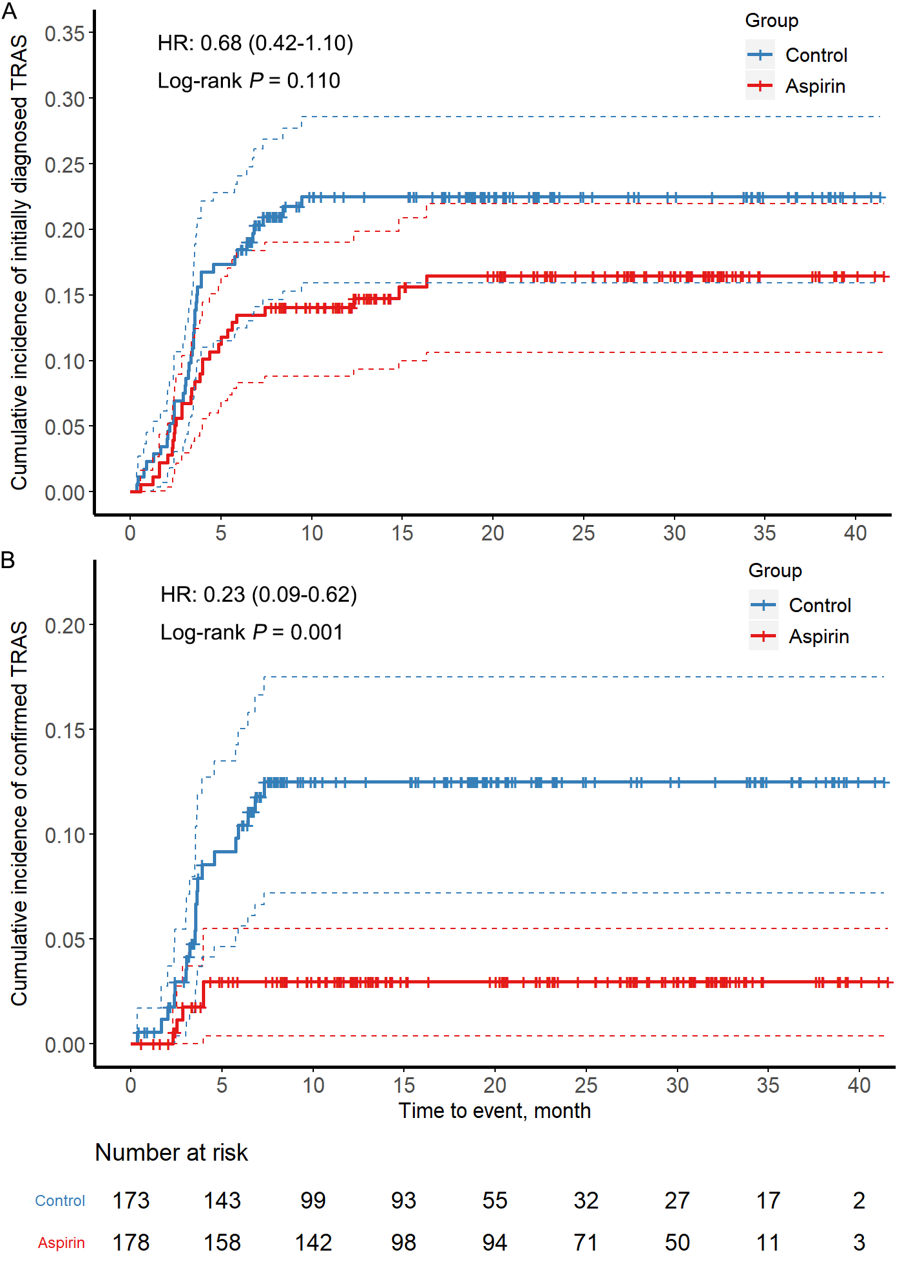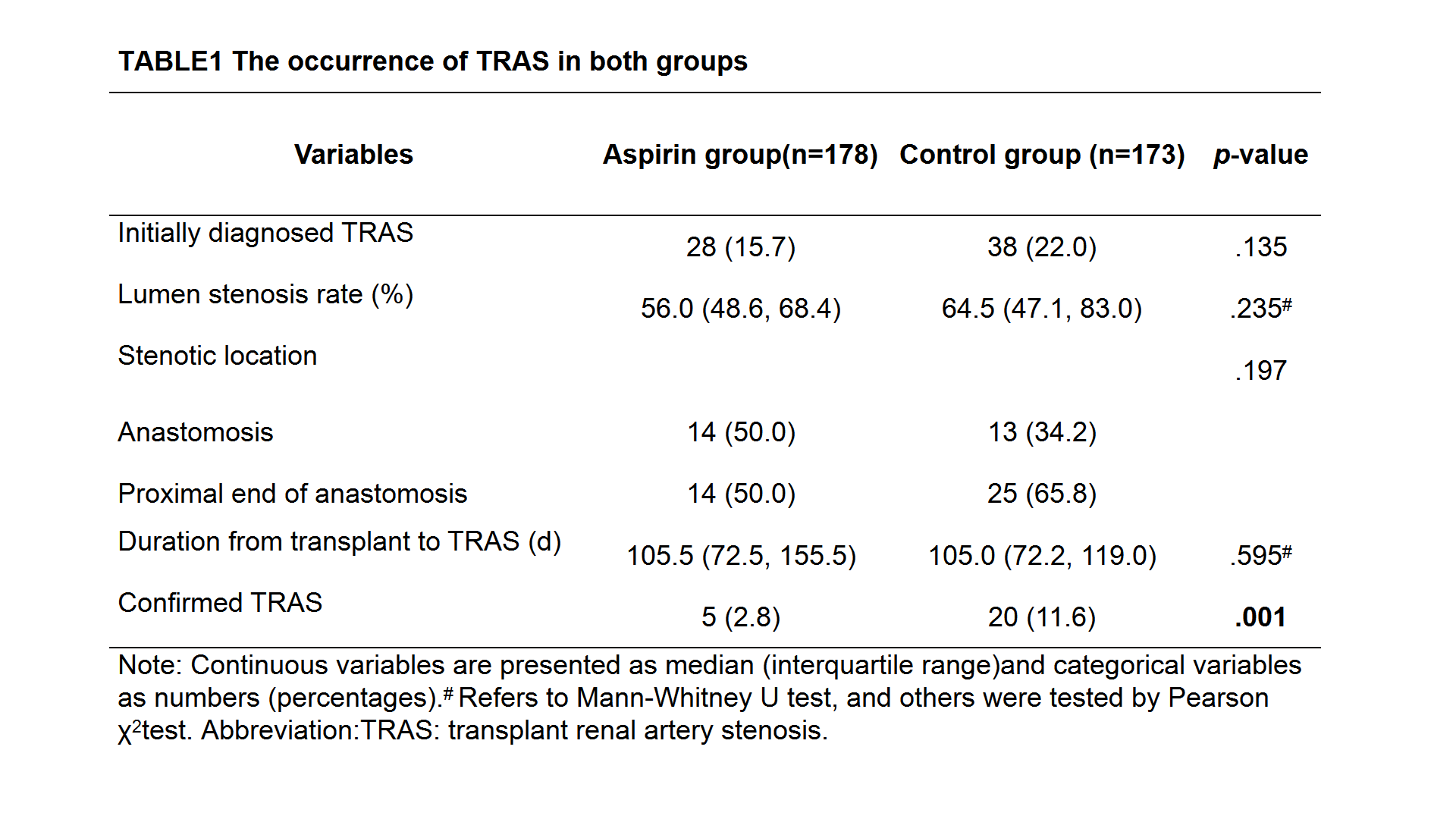Low-Dose Aspirin is Effective in Preventing Transplant Renal Artery Stenosis: A Prospective Randomized Controlled Trial
X. Tian, W. Duan, X. Niu, X. Wu, C. Zhang, J. Zhao, Z. Wang, G. Cao, B. Ji, Y. Gu, H. Cao, T. Qin, F. Shao, T. Yan
Henan Provincial People's Hospital, Zhengzhou, Henan Province, China
Meeting: 2022 American Transplant Congress
Abstract number: 23
Keywords: Kidney transplantation, Post-operative complications, Renal artery stenosis, Vascular disease
Topic: Clinical Science » Kidney » 35 - Kidney: Cardiovascular and Metabolic Complications
Session Information
Session Name: Kidney: Cardiovascular and Metabolic Complications I
Session Type: Rapid Fire Oral Abstract
Date: Sunday, June 5, 2022
Session Time: 3:30pm-5:00pm
 Presentation Time: 3:30pm-3:40pm
Presentation Time: 3:30pm-3:40pm
Location: Hynes Veterans Auditorium
*Purpose: Transplant renal artery stenosis (TRAS), the most common post-transplant vascular complication, leads to resistant hypertension, renal impairment, and even graft loss. No effective prophylactic measure for TRAS has been developed in routine clinical practice. The aim of this study was to evaluate whether low-dose aspirin could prevent TRAS.
*Methods: In this randomized controlled trial (NCT04260828), renal transplant recipients aged ≥18 years were recruited between 2018 and 2020 in our hospital. They received either low-dose aspirin (100mg/d) treatment or not, in addition to standard care. TRAS was prospectively evaluated throughout the trial with median follow-up of 17.6 months.
*Results: Among recipients randomly assigned to aspirin group (n=178) or control group (n=173), there were 28 (15.7%) and 38 (22.0%) cases who had developed initially diagnosed TRAS (id-TRAS), respectively. No statistical differences were observed between the two groups for id-TRAS, but for confirmed TRAS (c-TRAS) the difference was statistically significant (P=0.001). Lower incidence rate of c-TRAS was noted in the aspirin group compared to controls [5 (2.8%) vs 20 (11.6%), respectively]. Kaplan-Meier estimates and Cox regression model identified the cumulative incidence and hazard ratio of TRAS over time in two groups, showing that recipients treated with aspirin had significantly lower risk of c-TRAS than those who were not treated [log-rank P=0.001, HR=0.23 (0.09-0.62)]. The levels of platelet aggregation rate (P<0.001), cholesterol (P=0.028) and low-density lipoprotein cholesterol (P=0.003) in the aspirin group were decreased compared with the control group at the third month post-transplant. For the incidence of adverse events, there was no statistical difference between the two groups.
*Conclusions: Clinical application of low-dose aspirin after renal transplant can prevent the development of TRAS without significant adverse effects.
To cite this abstract in AMA style:
Tian X, Duan W, Niu X, Wu X, Zhang C, Zhao J, Wang Z, Cao G, Ji B, Gu Y, Cao H, Qin T, Shao F, Yan T. Low-Dose Aspirin is Effective in Preventing Transplant Renal Artery Stenosis: A Prospective Randomized Controlled Trial [abstract]. Am J Transplant. 2022; 22 (suppl 3). https://atcmeetingabstracts.com/abstract/low-dose-aspirin-is-effective-in-preventing-transplant-renal-artery-stenosis-a-prospective-randomized-controlled-trial/. Accessed February 7, 2026.« Back to 2022 American Transplant Congress


